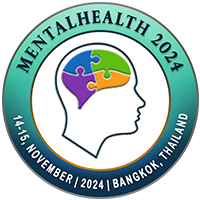
Anna Sala Estrada
Health Care Institute, SpainTitle: Five-years outcome for multi-family group therapy for young people with early psychosis in an early intervention Service in Psychosis
Abstract
Background: Multi-Family Therapy Group (MFGT) is a complex, rich, and inclusive intervention that consists of including in the same space, patients, families and a therapeutic team, in order to establish a conversation. In 2017 an Early Intervention Psychosis team (EIP) from the public mental health network provided a MFTG setting for young people with early psychosis (Sala, 2020). To implement and adapt the group we applied the principles of the Open Dialogue approach (Seikkula et al.,2018), the Irvin Yalom?s group studies, specifically, Giving hope and Interpersonal learning (Yalom, 2005) and the phenomenological perspective of Jakob Wyrsch?s (1949) which takes into account the person?s identity during the early stages.
Aims: During the first 5 years of the onset of psychosis the MFTG focuses on four objectives: attachment, emotional support, crisis intervention and to start the process of change.
Methods: The group was offered to all patients and families bi-weekly. They all had the freedom to come whenever they needed. It was held in a community setting creating a comfortable environment.
Results: The data was collected from 2017 to 2022. Total number of patients treated in the program, n=107. Total number of patients who have completed the 5-years program, n=37. Of the 107 patients, 45,7% (49 families) have participated in at least 1 group session, while 33,6% (36 families) have participated in more than 4 sessions. Out of the 37 who completed the 5-year program, 51,4% (19 family units) have participated in more than 4 sessions (regularly). The average was 12 participants and 7 families per session.
Conclusion: The group was created as an open, free and inclusive setting providing a bond that gives continuity for treatment in early psychosis, which helps in the recovery process.
Biography
TBA

